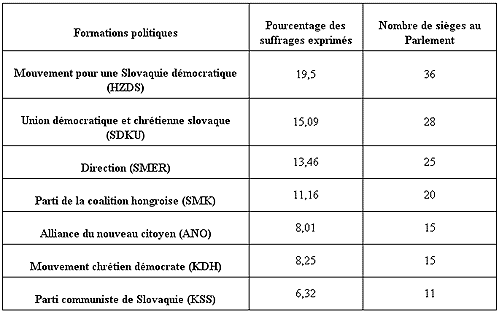News
Corinne Deloy,
Fondation Robert Schuman,
Helen Levy
-

Available versions :
EN

Corinne Deloy
Fondation Robert Schuman
Helen Levy
It was a surprise in Slovakia when the centre right parties won the general elections on 20th and 21st September. Mikulas Dzurinda, the out-going Prime Minister's Slovak Democratic and Christian Union (SDKU), that performed badly in the opinion polls, came second with 15.09% of the votes cast ie an improvement of 3 to 5% in comparison with the pollsters' forecasts. The party now has 28 MP's within the Slovakian Republic's National Council (Parliament). Although Vladimir Meciar's Movement for Democratic Slovakia (HZDS) won the general election with 19.5% of the vote, a score that is clearly lower than the 27% they managed to achieve four years ago, he finds himself marginalised and isolated on the political scene. The populist leader, who asked Rudolf Schuster, the President of the Republic of Slovakia, to give him the opportunity of creating a government, will not be in a position to find any other parties with whom to form an alliance. The HZDS will however comprise the most powerful opposition party in the National Council of the Republic.
The electorate clearly voted for Europe. Although a greater majority of the population did not express its support for the government at least they showed their unwillingness to return to the period of isolation they experienced over the four years when their country was led by Vladimir Meciar. The Slovak Democratic and Christian Union (SDKU) emerges strengthened from this general election. "We want a government that is based on a smaller coalition," declared Mikulas Dzurinda after meeting with the leaders of the three other centre right parties (KDH, SMK, ANO). With the SDKU they obtained a total 42,51% of the vote. For the past four years the Prime Minister led a very wide coalition comprising parties from both the left and the right. These groups were mainly established in 1998 to form a common front against Vladimir Meciar. "The President will invite those who can provide a written declaration that says it has a majority of at least 76 representatives to form the next Slovak government," declared Jan Fuele, Rudolf Schuster's spokesman on the announcement of the results. Mikulas Dzurinda has a total of 78 seats with his partners therefore he should be able to form the next government coalition and assume his position of Prime Minister once more. Like his own party his partners' scores are honourable. The Hungarian Coalition Party improved its score by 2% on its 1998 result gaining 5 MP's, thereby consolidating its position on the Slovak political arena. "Slovak society thinks of us as being loyal and that we merit their confidence" confirmed its leader, Bela Bugar. Pavel Rusko's New Citizens' Alliance succeeded in making a break through with 8.01% of the vote.
The other surprise in these elections was the Slovak Communist Party's performance with 6.23% of the vote, winning 11 seats in the Slovak Republic's National Council. It is the first time that the party has managed to enter Parliament since the country's independence in 1993. The communists are now the only leftwing representatives there. The Social Democrats who suffered internal dissension were the main losers in this election. Another loser is Robert Fico, leader of the SMER. He wanted to be the unavoidable element in the creation of the next government but has failed in his attempt to turn his party into Slovakia's leading political movement. With 13.46% of the vote he only took third place and will sit on the Opposition benches.
"These elections clearly showed the sustainable nature of the development of democracy in Slovakia," declared Michael Wygant, director of mission sent by the Organisation for Security and Co-operation in Europe (OSCE) to observe the elections in Slovakia. By this vote the Slovaks have demonstrated their desire for a European future just two months before the Prague Summit that will amongst others, decide on Slovakia's integration into NATO. It also comes just three months from the European Council in Copenhagen when the EU Fifteen will decide which countries will join them from 2004 onwards. The next government will have the heavy task of decreasing unemployment that affects 19% of the working population, and it will especially have to work on halting the corruption that is wreaking havoc across the country.
General Election Results 20th-21st September 2002:
Participation : 70.07%
 Source Agence France Presse
Source Agence France PresseOn the same theme
To go further
Elections in Europe
Corinne Deloy
—
28 January 2025
Elections in Europe
Corinne Deloy
—
14 January 2025
Elections in Europe
Corinne Deloy
—
3 January 2025
Elections in Europe
Corinne Deloy
—
17 December 2024

The Letter
Schuman
European news of the week
Unique in its genre, with its 200,000 subscribers and its editions in 6 languages (French, English, German, Spanish, Polish and Ukrainian), it has brought to you, for 15 years, a summary of European news, more needed now than ever
Versions :


